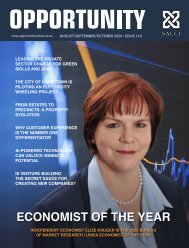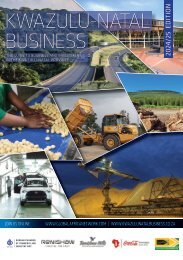Limpopo Business 2016-17 edition
The 2016/17 edition of Limpopo Business is the eighth issue of this highly successful publication that, since its launch in 2007, has established itself as the premier business and investment guide to the Limpopo province. Limpopo is unique in terms of its abundant natural and human resources, and is also one of the key drivers behind the South African economy. This edition of Limpopo Business is officially endorsed by the Office of the Premier of Limpopo.
The 2016/17 edition of Limpopo Business is the eighth issue of this highly successful publication that, since its launch in 2007, has established itself as the premier business and investment guide to the Limpopo province.
Limpopo is unique in terms of its abundant natural and human resources, and is also one of the key drivers behind the South African economy.
This edition of Limpopo Business is officially endorsed by the Office of the Premier of Limpopo.
Create successful ePaper yourself
Turn your PDF publications into a flip-book with our unique Google optimized e-Paper software.
INTERVIEW<br />
internationally but they will also be able to interact<br />
and link with the best <strong>Business</strong> Advisors in the<br />
world, who are certified users of the tool. One of the<br />
most important aspects of the Growth Wheel is the<br />
360-degree screening, as this helps our Advisors to<br />
quickly create an overview of all the challenges that<br />
might be relevant to the entrepreneur in question.<br />
The Advisor and the entrepreneur will be able to<br />
draw up a visual profile of how the business is doing,<br />
and this will assist them in identifying future growth<br />
opportunities and obstacles.<br />
The framework will be able to assist the parties to<br />
ascertain where they are in terms of their business<br />
development and provide a roadmap for where they<br />
could be going. The Advisor and the entrepreneur<br />
will be able to create a common language and offer<br />
ideas for new directions. This process will inspire<br />
entrepreneurs to set their agenda in terms of which<br />
decisions to make.<br />
The worksheets will help them to make decisions<br />
faster because they contain graphic checklists<br />
to quickly understand alternative options so they<br />
can get ideas for new ones. The 30 – 60 – 90 day<br />
plan is the tool that is ideal for entrepreneurs to<br />
keep track of their decisions and actions. It will<br />
also help the BA to keep track of actions that the<br />
entrepreneur had to undertake. The entrepreneur<br />
will then be able to focus on getting things done<br />
and who should do it.<br />
Can you share some examples of successful<br />
SMMEs that Seda <strong>Limpopo</strong> has<br />
helped over the past few years?<br />
The greatest impact we have had has been in terms<br />
of increased turnover and net profit. We don’t aim<br />
to make an impression in terms of employment opportunities,<br />
as most businesses always target minimum<br />
labour in order to reduce production costs and<br />
increase efficiency.<br />
Companies we have had particular success<br />
with include PCS (Polokwane Chemical Supplies),<br />
Goodlife, Rosika Trading, Tshedza Concrete Art,<br />
Sasekisani Co-operative, Mofamadi Bed and<br />
Breakfast, TKY Trading, Mogalaletsi Trading, Twins<br />
Trailers, <strong>Limpopo</strong> Ceramics, Pavecon, Bellstein<br />
Trading and Are Hudisaneng Agricultural Primary<br />
Co-operative.<br />
What message would you like to send to<br />
more established businesses and investors<br />
in terms of how they can help to support<br />
SMMEs and what the long-term benefits<br />
of offering such support are for the<br />
regional and national economy?<br />
It is very important to assist SMMEs where possible<br />
by providing access to markets. I would also<br />
recommend that it can be wise to invest in SMMEs<br />
as innovation usually forms the basis of their business.<br />
It is also a good idea to partner with Seda for<br />
development of our current BEE suppliers.<br />
Seda, in collaboration with the Department of<br />
Small <strong>Business</strong> Development (DSBD), has embarked<br />
on the Gazelles Programme, which seeks to change<br />
the landscape in the SMME sector of South Africa.<br />
Gazelles are found in all sectors of the economy<br />
and a common characteristic is that they are usually<br />
fast-growing entities. This growth occurs at a<br />
specific phase in a businesses development, after<br />
which they revert to the industry norm in terms<br />
of their continued growth, although this does<br />
not preclude the possibility of future fast growth.<br />
While these fast-growing companies are known as<br />
Gazelles, researchers also identified the “elephants”<br />
which are the big and ponderous companies that<br />
do not necessarily employ much (if any) staff. Lastly,<br />
researchers also speak of “mice”, which are the small<br />
and micro companies that will either not grow or<br />
whose owner-managers are not necessarily growth<br />
driven. For the purpose of this programme, South<br />
African “Gazelles” will be formal entities that grow<br />
exponentially and have an annual turnover of at least<br />
R1-million and are subject to definitions in terms<br />
of the Small <strong>Business</strong> Act of 1995 as amended.<br />
CONTACT INFO<br />
Physical address: Suite Number 6,<br />
2nd Floor, Maneo Building, 73 Biccard Street,<br />
Polokwane 0699<br />
Tel: +27 15 287 2940<br />
Fax: +27 15 297 4022<br />
Website: www.seda.org.za<br />
LIMPOPO BUSINESS <strong>2016</strong><br />
88


















